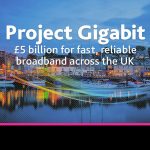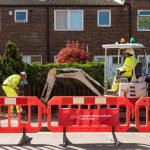UPD Rural Communities Report Says 2Mbps for All Target Must be the Priority
The government’s Department for the Environment, Food & Rural Affairs (DEFRA) has today been criticised by a new select committee report for its late delivery of the Universal Service Commitment (USC), which aims to ensure that 100% can access a minimum broadband speed of 2Mbps by 2015. The inquiry said this must now be “prioritised over increasing speeds“.
The report also reflected the outcome of a similar report from the National Audit Office earlier this month (here) and the Public Accounts Committee (here), which noted that the £1.2bn roll-out of superfast broadband (25Mbps+) to 90% of the country would be delivered around 22 months late (not technically correct as the target has been extended to 95% by 2017) and that it was now also “unclear when the target of universal access to 2Mbps broadband will be achieved“.
Advertisement
On top of that the committee also questioned why it had taken so long to allocate the extra post-2015 £300m from the BBC TV Licence to broadband (£250m of this is being used to push the superfast target from 90% to 95% of the country), which has been known about ever since the Broadband Delivery UK (BDUK) scheme was first launched in 2010.
It also warned that the £150m Mobile Infrastructure Project (MIP), which aims to make Mobile Broadband (3G or 4G) services available to “at least” 98% of UK people by the end of 2015, would actually do “little to improve geographic coverage” and would only help 60,000 premises currently in voice “not-spots” (down from the original target of extending coverage to 6 million people).
Chair of the Committee, Anne McIntosh MP, said:
“Broadband has become a basic utility yet thousands of people in rural communities have ridiculously slow speeds or no connection at all. The Universal Service Commitment of 2Mbps is crucial and meeting it must be prioritised over increasing speeds for those who already enjoy an adequate service. The Government must be clear when broadband will be available to those currently without access.
To expedite the roll-out of superfast broadband the Government must publish details showing precisely what areas will be covered by BT under the Rural Broadband Programme in order to allow alternative providers to fill in the gaps.”
But by now everybody is probably very tired of reading the fluff from various reports into the government’s Broadband Delivery UK (BDUK) scheme and so instead we’ll just cut to the chase and tell you what the recommendations are.
Report Recommendations
1. Work must take place to re-focus on the need to clarify and complete the original 2Mbps USC on time. In addition, 2Mbps must also be the minimum speed that users receive during periods of peak demand, not a headline ‘up to’ figure that is rarely achievable.
2. The government must give “encouragement and support” (including funding) to any alternative network schemes that propose to deliver something better than 2Mbps to related rural communities.
3. The USC should include a minimum upload speed target set at a level that meets the needs of SMEs and consumers. The Government-funded infrastructure must also have the capacity to allow such a speed to be achievable at times of peak demand.
4. The Government should set out how many households and businesses are not going to be covered by the roll-out of 2Mbps broadband under the Rural Broadband Programme, and the reasons for this.
5. BDUK and Ofcom should consider requiring BT, where it is in receipt of state aid, to disclose its costs in a way that permits comparison across contracts. Without such transparency it is difficult to see how value for money can be guaranteed, particularly now that the only competitor to BT has effectively ruled itself out of the bidding process.
6. Payment under the £20m Rural Community Broadband Fund (RCBF) is available solely on evidence of past expenditure. The grant should be there to help communities to roll out broadband infrastructure, not just a means of recovering some of the costs afterwards.
7. Less than 2% of government’s overall funding for broadband, has been made available to encourage and support innovative community-led solutions in these rural areas. Defra should expand the scope of the RCBF when the next round of RDPE funding is available.
8. Beyond-2015: The Government should draw on lessons from the RCBF and use the £300m funding from the BBC as a lever to encourage private and community sector capital and expertise. As a pre-requisite, the Government must publish details showing precisely what areas will be covered by BT and when, in order to encourage alternative providers to fill in the gaps and prevent bodies in receipt of public money competing with each other. We have already stated our belief that the RCBF should provide up-front support to projects and this should also be the case in the application of the funding from the BBC.
9. The Government must set out what improvement in geographical coverage the Government foresees as a result of the £150 million Mobile Infrastructure Project initiative.
We welcome the committee’s call for the government to re-focus its 2Mbps USC around actual speeds rather than advertised ones because at present many homes that are “estimated” to have 2Mbps capable lines often get much slower real-world performance. On the other hand it can be difficult to account for things like poor home wiring that can result in much slower speeds.
Advertisement
We also agree that upload speeds should be a part of the USC because, in the world of social media (photo uploads etc.), these have now become increasingly vital and yet they remain neglected. But most rural lines will be reliant upon ADSL or ADSL2+ technology and thus we shouldn’t expect any significant change unless the underlying technology is upgraded with something better like FTTC, fixed wireless or a full fibre optic (FTTP/H) solution.
However we were a little saddened to see that the committee didn’t use the opportunity to call for the USC’s target to be raised, perhaps to 5Mbps or 10Mbps. At present 2Mbps is still useful but increasingly people are learning to expect more and use ever higher quality online content (e.g. pictures and videos). It won’t be long before 2Mbps will begin to seem like yesterday’s modern equivalent of a dialup connection.
Generally speaking most of the points have either been covered before or are already well known about and yet the government’s approach remains unchanged. As it stands today we’re still waiting to see how the future structure of the Broadband Delivery UK (BDUK) scheme, which is currently being reshaped towards a more commercial focus and to take account of recent recommendations, will affect the overall process.. if at all.
The 6th Report – Rural Communities (PDF)
http://www.publications.parliament.uk/pa/cm201314/cmselect/cmenvfru/602/602.pdf
UPDATE 12:23pm
Advertisement
CityFibre, an urban developer of UK fibre optic networks, has furnished us with the following comment.
Mark Collins, Director of Policy at CityFibre, told ISPreview.co.uk:
“We welcome Anne McIntosh’s support for alternative providers because they are the ones with the ability to deliver. It is no surprise that BDUK has not been able to meet the scheme’s original aim to improve broadband speeds to all areas, not just rural, that are being held back socially and economically by a lack of connectivity. The incumbent provider, BT, has underperforming networks and has failed to deliver in many urban areas let alone the more challenging rural ones.”
Mark is a professional technology writer, IT consultant and computer engineer from Dorset (England), he also founded ISPreview in 1999 and enjoys analysing the latest telecoms and broadband developments. Find me on X (Twitter), Mastodon, Facebook, BlueSky, Threads.net and Linkedin.
« UPDATE Eutelsat and Skylogic Scrap Unlimited Tooway Satellite Broadband

















































Comments are closed